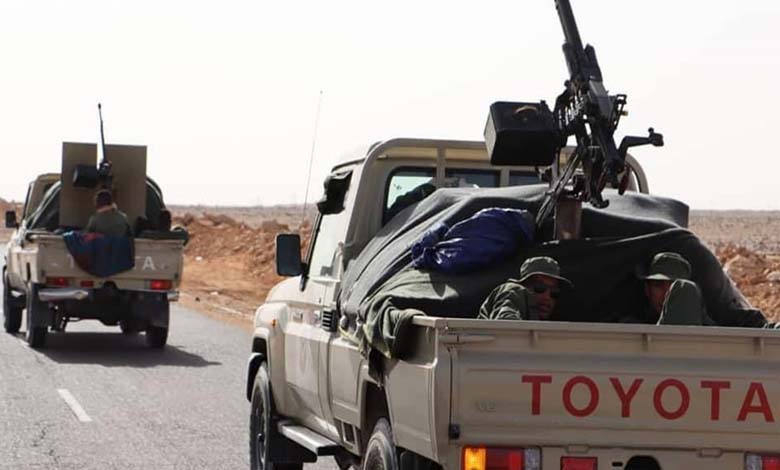Political Stalemate Brings Militias in Western Libya Back into the Spotlight

Armed militias are trading accusations of dragging the country into an imminent “civil war”, placing full blame on the Dbeibeh government for any escalation.
Military movements in various areas of the capital, Tripoli, have revived the specter of security division and militia dominance amid a fragile political situation marked by stagnation and mutual accusations between state institutions, which have hindered progress on the electoral path stalled for years.
-
Western Libya Ablaze: Bloody Clashes Turn Streets into Warzones
-
Libya Caught in the Crossfire of Great Power Rivalries… What Are the Possible Scenarios?
While Libyans aspire to a unified and stable state, signs of a new escalation are looming. Observers believe the rapid military developments reflect a state of unrest, coinciding with political paralysis and the decline of state authority, which armed groups have exploited to strengthen their influence in the country’s political scene.
Political analyst Abdullah Al-Dibani states that the ongoing military buildup in Tripoli reflects the fragile reality of the country in the absence of unified leadership to regulate security affairs. He stresses that the real danger lies not only in these movements but also in the fragility of the political foundation itself, where even a minor clash could escalate into an open conflict due to the deep divisions in security and political decision-making centers, according to Libya 24.
Al-Dibani notes that while armed groups may not be planning a full-scale confrontation, they are sending political messages internally and externally through displays of force. He warns that this situation threatens to undermine the chances of holding upcoming elections and may lead to their indefinite postponement.
Militias in western Libya remain one of the main obstacles to stability and unification since the fall of Muammar Gaddafi’s regime in 2011. These militias initially emerged to topple the regime but gradually turned into powerful forces seeking control over territory and resources, leading to recurring conflicts and undermining state authority.
-
Tension rises in Western Libya after assassination of one of the biggest human traffickers
-
Libya: Turkey supports mercenaries in favor of the Muslim Brotherhood
The Stability Support Apparatus, one of the strongest militias in Tripoli, is known for its drones and secret prisons. It is rivaled by the Deterrence Apparatus, which controls sensitive sites including the ISIS prison. Misrata, nicknamed “the arsenal of the west”, houses over 20,000 fighters and several armed factions such as the Halboos Brigade and the Hatteen Battalion, possessing aircraft and tanks, making it a major player in the region’s security landscape.
These militias compete over influence and resources, causing repeated clashes that threaten security and stability. Many are involved in fuel, weapons, and drug smuggling, as well as human trafficking, further fueling chaos. Numerous groups are also accused of committing human rights violations including killings, torture, and arbitrary detention.
-
Libya Caught in the Crossfire of Great Power Rivalries… What Are the Possible Scenarios?
-
Libya Thwarts a Major Terrorist Plot near the Tunisian Border
As field movements from Misrata toward Tripoli continue, militias have exchanged accusations of dragging the country into an impending civil war. The Tripoli Protection Force accused what it called “rogue elements organizing aggressive military mobilization” – including commanders of militias loyal to the outgoing Government of National Unity led by Abdul Hamid Dbeibeh – of attempting to push the country into a “senseless war to serve their corrupt agendas and seize power with the blood of innocents”.
It vowed a “severe and unprecedented” response to any military advance toward the city, holding the Dbeibeh government fully responsible for any escalation.
-
A Political Path and a Race for Influence… Libya at a New Crossroads
-
Is Libya Becoming a Hub for Exporting Armed Militias to Africa?
Leaders of revolutionary brigades and battalions in Misrata have firmly rejected the military movements of the Misrata Joint Force toward the capital, calling them “treacherous and a stab in the back of the homeland”, describing them as an attempt to ignite a civil war that would only benefit the enemies of the Libyan people.
There are growing calls for launching an inclusive dialogue to end divisions, unify institutions, and pave the way for elections. However, observers fear the current situation may open the door to foreign actors and plunge Libya back into a global power struggle.
-
The Fall of Khuwayb: Who is the leader of ISIS in Libya responsible for the massacre of Copts?
-
Escalating tensions… Airstrikes widen in western Libya
Thirty representatives from Libyan political party coalitions expressed concern over the ongoing political stalemate. In their meeting with the UN envoy to Libya, Hanna Tetteh, they emphasized the urgent need to unify state institutions, accelerate the political process, and enhance transparency in resource management.
They urged the UN mission to ensure the inclusion of all active political forces in future political tracks, warning of the risks of continued delay and stressing the need for a comprehensive approach to pave the way for elections.
For her part, the Special Representative reaffirmed the mission’s commitment to working with all parties, reiterating the importance of national consensus. She expressed hope that political parties will play an active role in driving positive change at all levels, including the local level.












